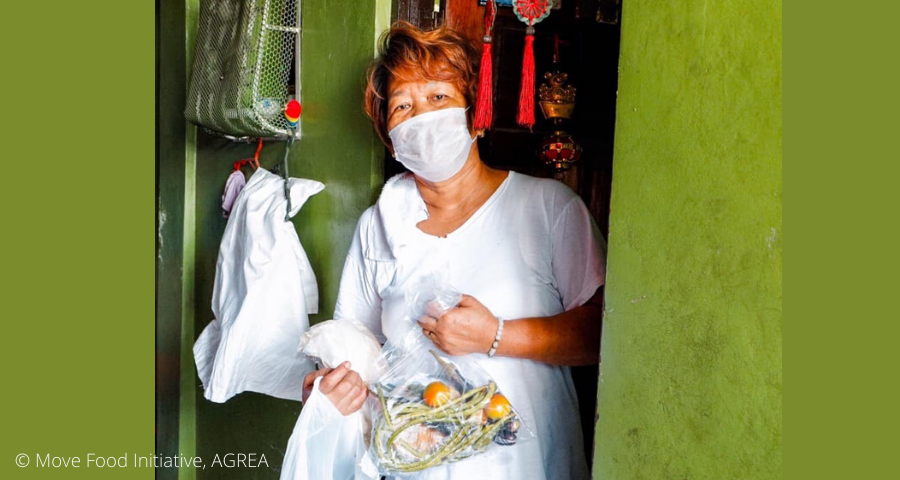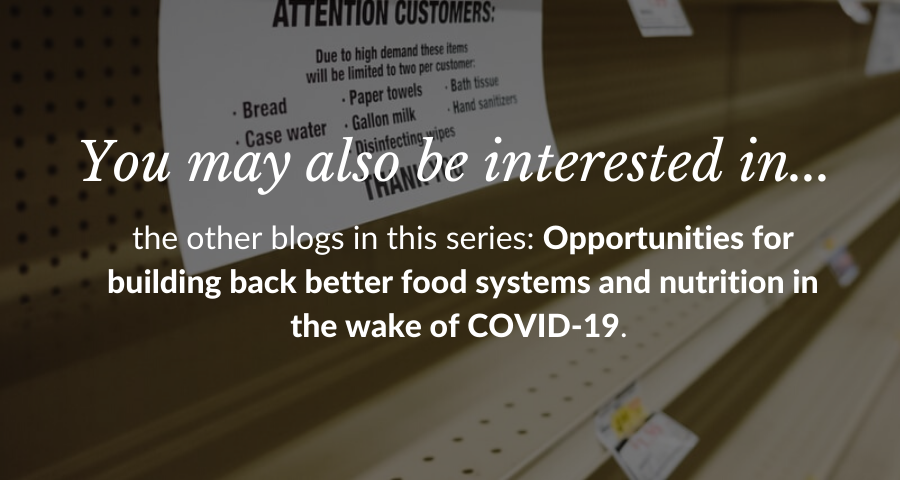It was on the evening of March 16 of this year when the President Duterte of the Philippines imposed the Enhanced Community Quarantine in Luzon (where our country’s capital – Manila is situated) in response to COVID-19. This restricted the movement of people and business and most of all, food. The lockdown was imposed during an important season for the country – harvest time for farmers. The domino effect on agriculture was, and continues to be, a challenge to the economy, as well as for populations unable to access nutritious foods.
Jobs
7.3 million Filipinos lost their jobs because of the pandemic. Meanwhile, the Philippine Department of Labor and Employment (DOLE) estimates that 10 million will be jobless – that’s 10% of our entire population (our population is currently 109 million). This affected many Filipino families in providing food, water, and shelter for their homes. Moreover, the local government units (LGUs) of our country have been providing cash aids and food packs for Filipino families. One of the most vulnerable populations as a result of the pandemic are the urban poor. They are greatly affected by the restricted movement, loss of jobs, and difficult access to healthy food.
Food and nutrition
I remember the day before the announcement, we bought groceries at a supermarket. The food section was close to being empty, every person’s cart was full, and the line to the cashier was unforgiving – people were panic buying.
A few days after lockdown, I received a call for help from a group of Agrarian Reform farmers. These farmers needed to sell 15,000 pineapples. Due to the limitations posed by the Enhanced Community Quarantine, these pineapple farmers couldn’t move and sell their produce, and they had to make the very hard decision to throw out their harvest. They were not the only farmers dealing with a stagnating food supply chain. Upland and lowland vegetable farmers in Luzon tapped us for the same reason – to move and sell their produce to the consumers. At the same time, consumers were also challenged in providing enough food for their families. Food shelves in supermarkets and stalls in wet markets were scarce to empty, as people were buying more than they need to ensure food on their tables.

Interventions and opportunities for jobs, food and nutrition
The COVID-19 pandemic has challenged our country’s economy (jobs) and people’s welfare (food and nutrition). However, I see agriculture playing an important role in helping the Philippines rise up from this health crisis to become more resilient. The pandemic shows how critical the food system is in ensuring this resiliency, and it should inspire public, private and civil societies to address this pressing issue now. I share four interventions that put food systems, and more specifically the agriculture sector, at the core of the COVID-19 response and involve the Philippine Government, private sector, and Filipinos.
1. Providing healthy food packs
The Filipino population is a resilient one. However, from typhoons, droughts, volcanic eruption, and now in this pandemic – there’s an increased trend to distribute and consume instant and processed food because of their long shelf-life. This has been the norm. But this norm is ironic. These troubled times should be a time where we are strong in body and spirit. Fresh and healthy food should be available and accessible to everyone.
This trend had caught the concern of some leaders in the Philippines during COVID-19. Food producers are having a hard time distributing healthy food, while consumers only have access to processed and instant food. Local Government Units have bought fresh and healthy food from the farmers, and distributed these to their constituents, instead of the usual instant and processed food. Private sector actors have also taken the lead on this as part of their CSR (corporate social responsibility). They tapped initiatives (like the Move Food Initiative that my organisation AGREA started to address the issues in food) to prepare thousands of healthy food packs for distribution to urban poor communities. Healthy food packs should be the trend – not just during this health crisis, but in every troubled time.
2. Return to the countryside – the Balik Probinsya, Bagong Pag Asa programme (Back to the Province, New Hope)
The Back to the Province, New Hope programme aims to boost countryside development, by addressing Manila’s congested urban areas. The programme encourages people to return to their home provinces, and the government will help them start anew through financial incentives that support transportation, education, livelihood opportunities and housing. Protecting agriculture livelihoods are a core investment of the programme.
3. Growing food in urban areas
The COVID-19 health crisis disrupted Philippine’s access to food. Domestic trade was imbalanced because of the lockdown restrictions: farmers from food production areas cannot transport their food to their main market in urban areas. This forced farmers to throw away crops causing food shortages for urban dwellers, especially the urban poor.
The Philippine Department of Agriculture leads the urban gardening strategy. This project provides free vegetable seeds, and training in growing food in urban areas. “With this project, we are empowering urban residents to be self-reliant and enjoy a regular source of nutritious vegetables”, Agriculture Secretary William Dar shared in a statement. To date, the Philippine Department of Agriculture has served 721,196 households with urban garden start-ups.
4. AGREA’s Move Food Initiative
This online fresh food ordering platform gets food producers connected to consumers. This initiative helps farmers who are struggling to get their produce to markets, and ensures consumers have access to affordable, healthy food. As of June 14, 2020, we have: transported 164,007 kilos of fruits and vegetables; delivered these to 68,427 Filipino families; helped 8,331 Filipino smallholder farmers, partnered with and donated 4,594 kilos of food to 10 kitchens feeding frontline health workers.
One of our partner-farmers has been able to pay his loan back to his bank and pay his child’s school fees. Other farming associations were grateful for the help of the Move Food Initiative in getting their harvest to the market. Our partner-farmers in Mindanao are able to provide healthy food for their families despite the lockdown. We did this through a fair trade mechanism of moving their harvest to the market, and providing logistical support.
I have been working in the agriculture sector for the past 22 years, I can affirm how the sector saves Filipinos every day. I have high hopes and confidence that the sector can help us rise up from this health crisis. Resilience is good, but our individual actions will make the difference. Actions such as growing our own food in our homes, investing in agriculture and fisheries, supporting smallholder farmers by buying their products, and providing agri-inputs to our farmers and fisherfolk will surely enable all of us to have food on our tables, and rise up as a nation.
Cherrie D. Atilano, CEO of AGREA International, is a staunch advocate of sustainable food systems. She has been teaching farmers since the age of 12. A graduate of agriculture with highest honors. Young Global Leader of the World Economic Forum and Scaling Up Nutrition (SUN) Ambassador/Lead Group Member.

